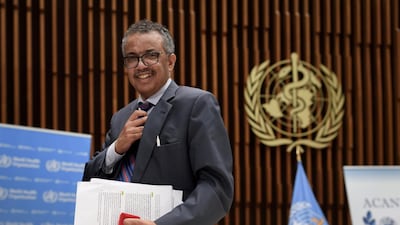The head of the World Health Organisation on Thursday praised the precautionary measures taken by Saudi Arabia during this year's Hajj.
"I’d like to congratulate the kingdom of Saudi Arabia for the steps it has put in place to make the Hajj as safe as possible this year," Dr Tedros Adhanom Ghebreyesus, the WHO's director general, said in Geneva.
"This is a powerful demonstration of the kinds of measures that countries can and must take to adapt to the new normal."
The Saudi assistant minister of health said that no coronavirus cases were recorded among the pilgrims.
The scaled-back pilgrimage begun on Wednesday, with about 1,000 pilgrims attending, compared to the usual 2 million.
Instead of praying shoulder to shoulder in large crowds, pilgrims have been socially distancing and only allowed to move in groups of 20.
Usually throngs of them come from abroad but this year, only foreigners who live in the kingdom were allowed.
Pilgrims had to apply through an online portal, be aged between 20 and 50, and have no terminal illnesses or virus symptoms.
Strict health guidelines have to be adhered to this year, with worshippers having to be quarantined before and after the pilgrimage.
Face masks are mandatory at all times and those taking part were subject to temperature checks and virus tests before they began arriving in Makkah over the weekend.
Hajj usually attracts pilgrims of all ages, but this year it is only open to younger generations.
Dr Tedros warned that younger people are also at risk of contracting Covid-19.
"One of the challenges we face is convincing younger people of this risk," he said.
"Evidence suggests that spikes of cases in some countries are being driven in part by younger people letting down their guard during the northern hemisphere summer.
"We have said it before and we’ll say it again: young people are not invincible.
"Young people can be infected; young people can die; and young people can transmit the virus to others.
"That’s why young people must take the same precautions to protect themselves and protect others as everyone else.
"They can be leaders. They should be leaders and drivers of change."
Saudi Arabia has had more than 274,000 cases of Covid-19 and 2,800 deaths from it, in the largest outbreak for the GCC.
The kingdom, which was under strict lockdowns and curfews, eased restrictions only last month.

